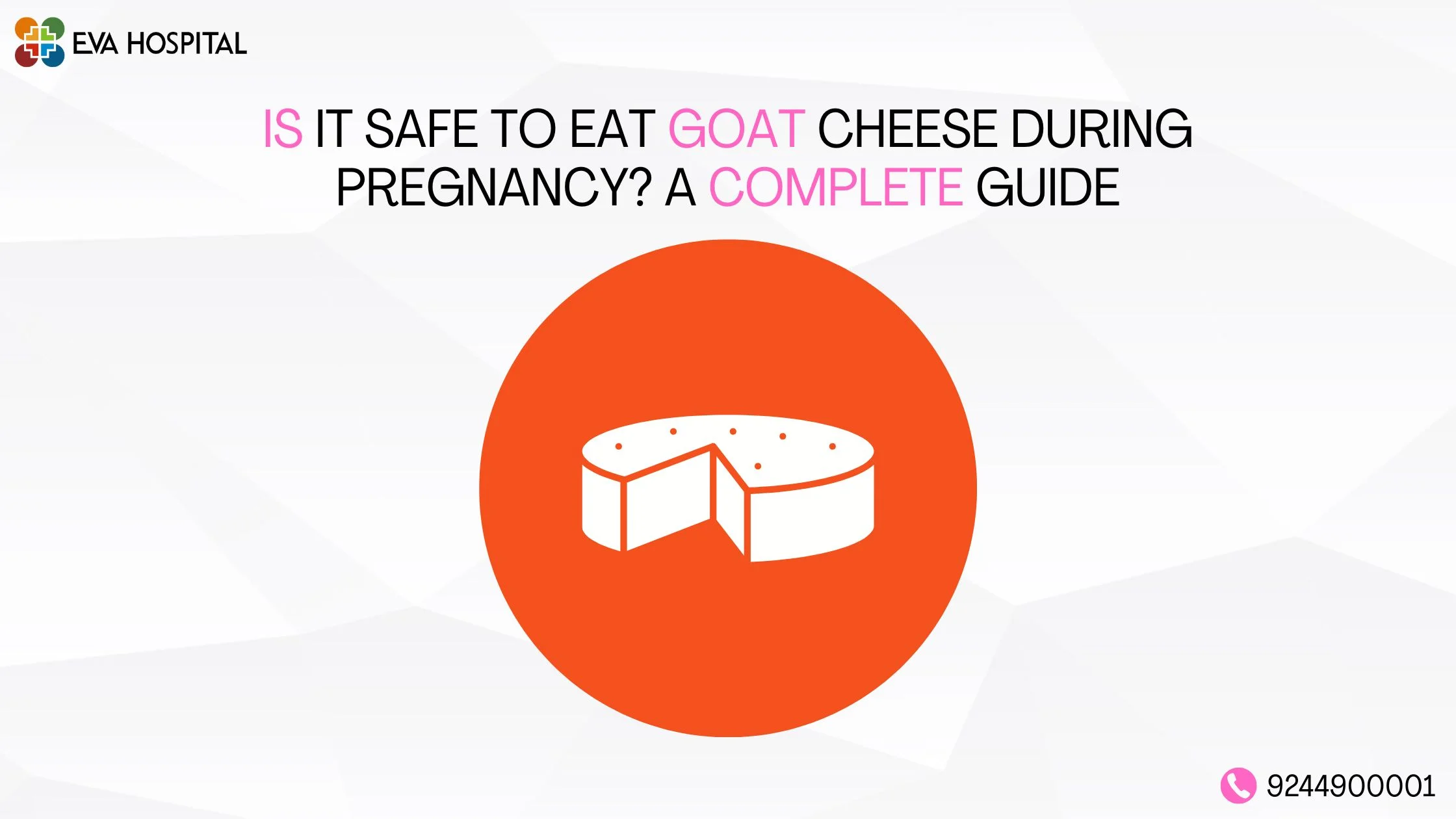Summary
Eating goat cheese during pregnancy can be safe but it depends heavily on the type and preparation of the cheese. The primary guideline is that one should select varieties that are prepared using pasteurized milk and to avoid those that are soft and mould-ripened which can harbor harmful bacteria. Goat cheese may be a healthy component of a pregnancy nutrition when chosen and stored properly, which means that it is a source of protein, calcium, and the other nutrients that the mother and the baby need.
Introduction
Hi there I am Dr Shivani Bhutani, working as gynaecologist in Eva Hospital. Being known to many as the reputed gynae doctor in Ludhiana. I will guide you all about eating goat cheese during pregnancy. Many women find themselves wondering during pregnancy, “can you eat goat cheese during pregnancy?” It is not a matter of yes or no but rather an answer to a few important questions like the kind of goat cheese, the way it is processed and how it is handled.
The phrase goat cheese during pregnancy often brings mixed opinions because some types are completely safe while others should be avoided. The main concern is the risk of Listeria monocytogenes, a bacteria that can be dangerous for pregnant women and their developing babies. Listeria leads to severe complications such as miscarriage, premature delivery of the infant, or infant infection. Nevertheless, the risks can be prevented using appropriate knowledge and precautions.
Goat cheese is also associated with numerous benefits – it is rich in calcium that has an impact on bone formation, proteins that help to grow, and healthy fats that support the brain activity. It is a tasty and digestible substitute of the cows milk cheese that is usually not so hard on the stomach. This is the ultimate guide to all you need to know about safely eating goat cheese when pregnant, including the risks involved, the types of cheese you should purchase, and how to safely eat them.
Is Goat Cheese Safe During Pregnancy?
When deciding whether goat cheese during pregnancy is safe, the answer comes down to pasteurization, texture, and proper storage.
Pasteurization: When cheese is produced using pasteurized milk it can be taken to be safe since the heat applied destroys harmful bacteria.
Texture: Hard or semi-hard goat cheeses are being low-risk as opposed to soft and moist varieties that promote bacterial growth.
Storage: Storage in good refrigeration is essential – cheese at room temperature may become unsafe easily.
Ripening: Unpasteurized mould-ripened cheeses that have white rinds (such as brie-style chèvre) are prone to bacteria and should be avoided.
These precautions have allowed one to safely enjoy a creamy taste of goat cheese without the fear that he or she will get into health complications.
Why Pasteurization Matters
One of the issues that can be used to establish the safety of goat cheese by pregnant women is pasteurization. This is done through heating of milk to a certain level to eliminate these dangerous bacteria like Listeria, Salmonella and E. coli which are more likely to cause harm to the pregnancy when retained in unpasteurized or un-raw milk products.
This is why pregnant women must never overlook the label. In case it is made with pasteurized milk of goats, the cheese is safe to consume. Without label stating that it was pasteurized, guess it is not and avoid it. Purchasing the way a reliable vendor will help eliminate the possibility of unintentional contact with dangerous cheese.
Hard vs Soft Goat Cheeses
The safe ones are hard goat cheeses, which include aged cheddar or gouda, due to low moisture levels and increased time of aging, which prevents bacteria growth. On the other hand, soft goat cheeses are more likely to be contaminated: they have more moisture and are the optimal place where bacteria can live.
Even in case you are fond of soft cheeses, you may enjoy them still but with one condition they should contain pasteurized milk and you should cook or bake it to destroy all chances of any contamination.
Can You Eat Goat Cheese During Pregnancy What to Include
If you’re wondering “can you eat goat cheese during pregnancy?”, the good news is that you can, provided you make safe choices. The following are the best practices to consider in having goat cheese in your pregnancy diet:
- Select pasteurized ones: It must always say on the label that it is made out of pasteurized milk.
- Limit yourself to hard or semi-hard cheeses: The cheeses are the safest and equally as good-tasting.
- The soft cheeses should be cooked: Baking goat cheese till it becomes steaming hot destroys bacteria that might be present.
- Store right: Refrigerate cheese at or below 40 o F (4 o C) and do not leave it unrefrigerated longer than two hours.
- Moderate eating: Goat cheese is well balanced, yet it is also very rich in fats and sodium. The balance of calories would provide the health benefits without too much of calories.
Nutritional Benefits of Goat Cheese
Goat cheese has a lot of nutritional benefits when one is pregnant. It contains a lot of calcium thus making the baby strong in terms of bones and teeth. The quality protein is high and assists in growth of the tissues and helps to sustain the energy levels. The goat cheese also has vitamins A and D, which are essential in the functioning of the immune system and healthy eyesight.
Goat cheese has a low lactose content compared to cow milk cheese and hence it is less challenging to digest by women who become sensitive during pregnancy. Its medium-chain fatty acids also enhance better metabolism and balance of energy that keep pregnant women nourished and active.
How to Include Goat Cheese Safely in Meals
Goat cheese can be served in many different ways and you will not need to sacrifice the safety. Pour crumbled goat cheese into hot pasta dishes or baked casseroles in which the cheese will be cooked completely. Pasteurized goat cheese is spread over whole-grain toast or melted over baked potatoes.
In case you are in the mood to eat soft goat cheese, put it in the oven until it becomes hot and bubbles: heating to an internal temperature of at least 165 o C (74 o C) makes it safe. Never place cold unwarmth goat cheese on salads except in the event that you are completely sure that it is pasteurized.
Soft Cheese During Pregnancy The Key Considerations
The phrase soft cheese during pregnancy often raises red flags, and for good reason. Soft cheeses – such as most varieties of goat cheeses may harbor bacteria provided that they are prepared with unpasteurized milk. The women who are pregnant are more susceptible to these infections due to the temporarily compromised immune system.
When enjoying goat cheese during pregnancy, it’s important to distinguish between safe and unsafe soft types:
- Do not use any cheese that has a bloomy rind (such as brie-style or camembert-style chèvre).
- Select plain soft cheeses that are pasteurized and have no rind or mould growth.
- In case you do not know where the cheese was kept or where it was sourced, heat the cheese and then eat.
Types of Soft Goat Cheese to Avoid
Some varieties of soft cheeses made out of goat milk are to be avoided during pregnancy, unless cooked. These are raw milk chevre, old fashioned rind goat cheeses and those that are molded. White rind or white mold surface is the best habitat of bacteria even when refrigerated.
Listeria is a cold-resistant bacterium that may be present in unpasteurized soft cheeses. The symptoms are slow to manifest and therefore prevention is the greatest defense, so when buying cheese, always check the pasteurization status and origin of the cheese.
Safe Soft Goat Cheese Practices
There is one way you can still have fun with it even when you come across a pasteurized soft goat cheese. You should keep it in the fridge and eat it within a few days after you have opened it. Do not purchase cheese at the open-air markets where temperature is not controlled. Heat soft cheese till steaming all throughout when preparing meals, particularly when it is to be used as a filling or as a topping.
When pregnant women go out to restaurants they should also be careful about what they eat, you should always enquire of the goat cheese in a dish whether it is pasteurized or not. The imported cheeses which are used in restaurants do not always meet the same standards of safety.
Can I Eat Goat Cheese While Pregnant
The question that most pregnant mothers are likely to ask is whether they can consume goat cheese during pregnancy. The answer to this is a simple yes, provided it is pasteurized and handled in a safe manner. We will discuss a couple of frequent issues:
Is it safe to eat goat cheese if it’s baked in a pizza or casserole?
Absolutely. Baked or grilled food that has goat cheese is safe, as cooking destroys Listeria and other pathogenic bacteria. As an example, a pizza with goat cheese, baked to puffing, is a good and safe meal.
What should I avoid when it comes to goat cheese during pregnancy?
Chemicals to avoid Unpasteurized cheeses, mould-ripened cheeses, and any goat cheese with a white rind that has not been heated. Always avoid long staging cheeses that are not refrigerated including cheeses on buffet tables or open plats. In any case that is doubtful leave it, or take something cooked.
Conclusion
In summary, goat cheese during pregnancy can absolutely be safe and healthy when chosen wisely. The three golden rules are pasteurization, proper storage and proper preparation. It is always best to use pasteurized ones, which are preferably hard or semi-hard ones, and cook soft cheeses to a point before consumption.
With these precautions, you will be able to keep enjoying the rich and tangy taste of goat cheese and still benefit the nutritional value it has to offer. It is a delicious method of increasing the levels of calcium, protein, and energy during pregnancy. Keep in mind, at all times, the rule is that when you are not certain about the safety of a particular cheese; then it is better to avoid it or consult your healthcare provider.
Last suggestion: Always burst it off. Goat cheese: cooked goat cheese dishes such as baked chèvre on toast or melted goat cheese pasta can be very yummy and safe at the same time to you and your baby who is growing.
FAQ
Yes. Used in moderation and appropriately, goat cheese in pregnancy shall be a part of a balanced diet, with calcium, protein, and omega, provided.
Trace packaging to look after whether it is pasteurized milk or not. Do not purchase cheeses that have rind or mold without cooking, and make sure to purchase well-known brands or outlets.
Don’t panic. The risk is minimal, but consult your healthcare provider regarding it, particularly when you get flu-like symptoms or a fever in the two months after consumption.
Not necessarily. Pasteurized milk is soft and could be made into a cheese which is safe when stored and handled well. The issue occurs primarily with unpasteurized or mould-ripened ones.
Definitely. Goat cheese has the fundamental nutrients such as calcium, vitamin D, and protein, which aid in the development of the fetus of the bone and brain. It is just necessary to remember to have it as a part of a balanced diet.
Yes. Goat cheese is less lactose and has other forms of protein and therefore it is easier to digest by many people including pregnant women who are normally not very sensitive to lactose.
Moderate intake- one to two servings per week is the best. Excessive consumption of cheese may add up to saturated fat hence it should be balanced with fresh fruit, vegetables, and whole grains.
















